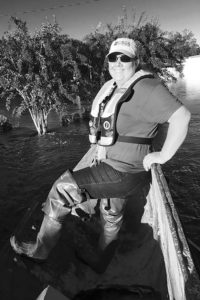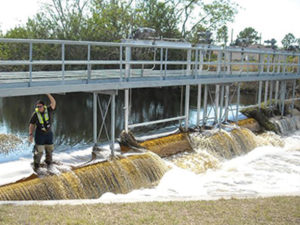
Water. Without it, we can’t survive. With it? Well, when we’re drinking it, quality is key. When we’re hunkering down during a hurricane, quantity keeps us alert. During a drought, availability tops the list.
Enter professional hydrologic technicians, whose job it is to monitor, record and analyze virtually every aspect of water and how it affects our world.
In her position as a hydrologic technician for US Geological Survey (USGS), Kendra Smith (’08, Marine Science) has been doing that very thing for the past decade. Two months after her graduation, she secured a position in USGS’s Fort Myers office. Today, she works out of Columbia, S.C., collecting the data that scientists rely on to keep us safe.
“I started taking groundwater measurements, moved into surface discharge and tidal work,” Smith says. “I learned to install monitoring sites in wells, rivers and coastal areas. We’re looking for certain criteria, so we set up an enclosure with transmitters, data collectors and sensors. We look at water level, temperature, velocity and many other parameters to help us answer the question, ‘What’s happening here?’”
USGS is about gathering information, which, as expressed on its website, water.usgs.gov, “is fundamental to national and local economic well-being, protection of life and property, and effective management of the nation’s water resources. The USGS works with partners to monitor, assess, conduct targeted research and deliver information on a wide range of water resources and conditions including streamflow, groundwater, water quality and water use and availability.”
 Smith describes the work as quality assurance. “It’s a vast monitoring program,” she says. “The site-sensing systems are transmitted to satellites and posted on the web, not only for professionals, but also so the public can review data of interest to them.”
Smith describes the work as quality assurance. “It’s a vast monitoring program,” she says. “The site-sensing systems are transmitted to satellites and posted on the web, not only for professionals, but also so the public can review data of interest to them.”
Hurricane forecasting is one major example and of interest to many. During a hurricane, hydrologic technicians are deployed to put out storm surge sensors that measure data critical to forecasters whose job it is to keep us all safe. “This data helps forecasters make those decisions – Should you evacuate? When should you evacuate? What should you expect in terms of storm surge? From my perspective, I think it’s very cool to provide the data that helps solve these and other problems.”
Smith transferred to FGCU for her junior and senior years, after having attended two other colleges which, she says, did not motivate, or inspire her.
“FGCU impressed me immediately,” she says. “I was able to take specialized classes, only available to graduate students at these other colleges. Classes like sediment dynamics, coastal and watershed geology. We went on lots of field trips. It was a very encouraging environment.”
“The culture of inspiration and the fostering of individual success sets FGCU apart from other institutions, in that graduates leave with the sense that they aren’t just another product of the public university system but are capable and worthy new members of the workforce.”